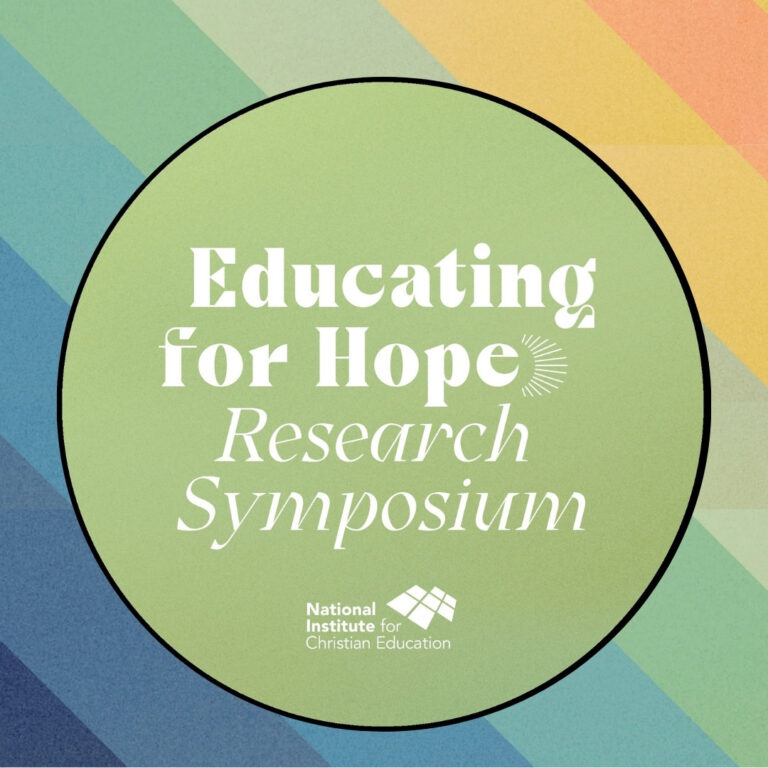
The NICE annual Educating for Hope Research Symposium aims to bring together Christian education scholars from around Australia and overseas to exchange scholarly research, insights and innovations, in order for our Christian education sector to flourish and grow. The 2025 symposium will be a full-day, in-person and (partially) online event held at the Alphacrucis University College campus in Sydney.
Community, Creativity, and Critique: Research and Scholarship for Restoration
The field of education faces major complexities felt by institutions globally and schools locally. Challenges are wide-ranging, from teacher shortages and burnout, shifting curriculum and pedagogical requirements resulting from multiple crises such as the pandemic, a mental health epidemic, environmental threats, social media misuse, the emergence of AI and new digital technologies, and growing disparities in access to education for students, particularly in marginalised communities. The implications of these challenges for leadership, professional administration, and in terms of educational risks and accountabilities have been enormous.
Intersecting and compounding, these challenges call for responses that move beyond human intellect and draw deeply from God’s imagination for a flourishing earth. The first picture of this is in the Garden of Eden. This is where we see the first pattern of community (being with God and each other), creativity and delight (in work that generates beauty and enjoyment), and discernment or critique (in creating things that are just, meaningful and good—and naming them).
The focus of this symposium is on research and academic scholarship that reflects how our scholarly work in the field of education engages these biblical themes of community, creativity, and critique. In research scholarship that reflects the reality of God’s vision for flourishing, we can plant seeds that grow into antidotes of restoration amongst the brokenness of our world.
Community: The person of God (Father, Son, Holy Spirit) is a community, out of which all creativity (creation) and all that exists is born and given life. That God created us (human beings) to become part of this community is a profound gesture of love and inclusiveness. It is also an invitation for us to join him as co-creators and co-workers in continuing to generate all that is good, beautiful, right and flourishing. How does this original pattern of God-community, marked by inclusiveness, mutual care, responsibility, and shared purpose, come to bear on our educational environments? How do our classrooms, boards, school leaders and institutions cultivate this vision of shared life? How can this reality address division, inequity, and isolation, or foster collaboration among communities for growth, relational wholeness and healing?
Creativity: Sometimes, we reduce creativity to an optional extra. However, we are made in the image of a God who is creative and generative in ways we can barely fathom, creating order from chaos, unnumbered diversity of species, breathtaking beauty in the elements, astonishing scales of matter from quarks to galaxies—and imbuing all this with meaning and purpose. God’s creativity wasn’t and isn’t an optional extra. As his image-bearers, creativity is deeply intertwined with how we experience Him and assign meaning and purpose to life. How can we participate in our God-given creativity in our scholarship and research? How can we cultivate creative and innovative learning environments and inspire curiosity, wonder and problem-solving? How can our school environments, including professional learning, leadership, curriculum and pedagogical practices, reflect the delight and beauty of creative expression and a biblical vision for renewal through Christ?
Critique: We see a pattern of discernment clearly in the biblical account from creation to new creation. God distinguishes between light and darkness, land and sea, humanity and the rest of creation, and work and rest. Critique in this pattern is not about finding fault, but engaging with how ideas, policies, practices and communities might more clearly bring God’s love to light in truth, justice and grace. How, as Christian scholars, can we use this biblical pattern of critique and discernment to name and reveal God’s intention for human flourishing in this time and place? By what scholarly lenses can we unhide biblical responses to, or bring a prophetic voice to, contemporary issues in education such as AI, mental health challenges, leadership issues, environmental sustainability, systemically marginalised student communities, or other institutional areas of fracture and stress?
Call for Presentation Abstracts

We welcome abstract submissions from researchers in a variety of contexts, including K-12 schools, higher education institutions, and other organisations involved in Christian education research and scholarship. We encourage submissions from scholars, educators, and graduate students (for example, NICE graduates) working in the field of education.
Proposals may include different types of scholarly work connected with the conference theme of community, creativity, and critique, including:
- Original primary (empirical) research projects completed or in progress.
- Conceptual or theoretical investigations drawing on the philosophy of education, or theological foundations for relevant themes in education.
- Best practice research for innovative programs, partnerships, community practices in education fields, and/or recommendations for educational or school policy.
The research symposium will include a keynote research address, as well as concurrent (strand-based) research presentations, depending on presenter numbers.
Submissions are due by January 31, 2025. Proposals received by this date will be reviewed, and individuals will be notified of the decision in late January 2025.
General Information
The symposium abstract submission and presentation program involves the following information:
- We aim to be as inclusive as possible and provide opportunities for as many presenters as possible to be involved in the symposium program, including those new to scholarship.
- Presenters may submit to present with other scholars if research or scholarship has been completed collaboratively. There is a field to indicate this in the abstract submission form.
- The symposium committee reserves the right to select speakers from abstract submissions. If necessary, the content committee will provide feedback on proposals.
- The committee will create a program for session streams based on the themes and accepted submission numbers.
- Please note that the acceptance of your proposal for a presentation at the symposium does not automatically register you for the conference. Presenters and speakers must register and pay for the conference separately.
- Each presentation will be approximately 20 minutes in length, with additional Q&A time. The exact presentation length will be finalised when approximate presenter numbers are known. Presenters will be advised accordingly.
- Registration will include an online option to allow international guests to view some of the program. Please note however, that all presentations will be in-person only.
If you would like further information please email: [email protected]

